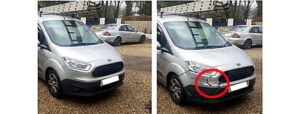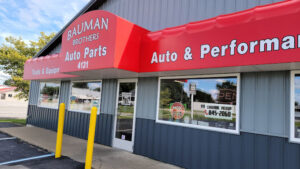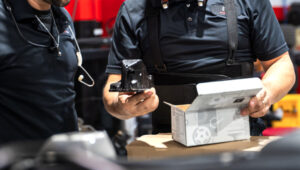Experts stress that auto shops need to have multiple strategies to alert and evacuate people safely, especially for shops that don’t rely entirely on cell networks
Most automotive service and repair shops have already implemented policies after their own history with destructive fires. States, like California, have adopted strategies that are known to reduce the risk of a fire spreading. Despite the National Fire Protection Association (NFPA) recommendations, Hawaii fire experts say little was done over the last few years for fire prevention in West Maui.

Many seafront cities on the mainland have installed siren networks that can broadcast voice messages, like Mill Valley, California, where wildfires are a danger. In Alaska’s Kenai Peninsula, the sirens play pre-recorded messages to tell residents what kind of threat they’re alerting about, like a volcano, tsunami or storm, then instruct residents to tune into the radio for more details.
Disaster response experts stress that auto shops need to have multiple strategies to alert and evacuate people safely, especially for shops that don’t rely entirely on cell networks.
Some states require shop owners to conduct and document fire inspections. In San Diego, if a shop owner doesn’t comply, the city can hire a contractor to do the work and put a lien on the property to recoup the cost.
“My hope would be that what just happened in Hawaii is really a wakeup call, so that any facility that has fire risk of this sort is planning ahead to keep citizens safe,” says Michael Wara, Director of the Climate and Energy Policy Program at the Woods Institute for the Environment at Stanford University.
As the community in West Maui begins a slow recovery after the deadliest U.S. wildfire in the last century, one of the biggest questions is how a similar tragedy can be prevented.
The government’s own reports show that West Maui is at severe risk for wildfires because the foothills are covered in dry, highly flammable invasive grasses. Previous OSHA, EPA and NFPA recommendations include improving evacuation plans, managing dry vegetation around your facility and clearing defensible space around buildings.
No precautions are guaranteed to stop a fire, especially in extreme winds. However, fire experts say the Maui tragedy shows that service and repair shop owners cannot ignore their own warnings.
The Maui fire during hurricane season raises the question of whether documents like NFPA 850 should go the extra step in providing recommendations specific to certain natural disasters. NFPA’s division director of Technical Services Guy Colonna said, “An incident resonated in the same way for me as Hurricane Harvey,” referring to the hurricane that battered Houston.
After Harvey reportedly caused hundreds of thousands of gallons of oil to spill out of industrial facilities along the Texas coast, Colonna and other experts told NFPA that they thought codes like NFPA 400, Hazardous Materials Code, should be more specific about addressing the threat of extreme weather.
A similar disaster happened in the town of Paradise, California, during the deadly Camp Fire in 2018. “Look at how often cell phone towers like in Paradise and Maui get burned right away,” says Thomas Cova, a Professor of Geography who studies evacuations at the University of Utah. “That’s the first thing that happens is the fire burns the cell phone tower.”
Every auto shop owner will have a bad day, but you push ahead because you know how important your work is to countless individuals and the community. For these very bad days, think of the Hawaiian legend around Pele, the Goddess of Fire. It is said that Pele’s father sent her away from her home in Tahiti because she had a hot temper. She was always getting into arguments with her sister, Na-mako-o-Kaha’I, who was the Goddess of the Sea. Pele left Tahiti in a canoe that she borrowed from her brother and went to Hawaii where she made many fiery volcanoes. Native Hawaiians, like their ancestors, say nothing can be done about catastrophes that are the work of Madame Pele, believing that “Our deity is coming down to play,” a hula dancer and poet told The New York Times. “There’s nothing to do when Pele makes up her mind but accept her will.”
The Small Business Administration announced that it was offering loans of up to $2 million to businesses and private nonprofits for both physical and economic injury and opening an on-the-ground center at 590 Lipoa Parkway in Kihei.
For more information
Interested parties can download Small Business Assistance information at https://www.recslock.com/ or go to: https://www.environmentallawandpolicy.com/2019/06/epa-announces-national-compliance-initiatives/











Comments are closed.